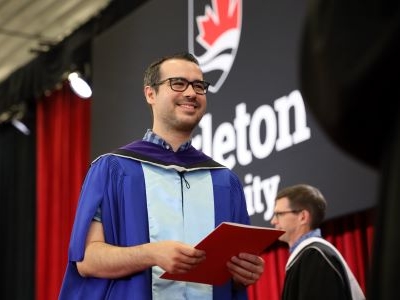Written by PhD candidate (School of Linguistics and Language Studies) Olga Makinina.
 Why do we say “plastic surgery” but not “plastic operation”? Why is it “fast food” but not “quick food”?
Why do we say “plastic surgery” but not “plastic operation”? Why is it “fast food” but not “quick food”?
While native speakers of English never really think about the way that words combine together, for non-native speakers of English, it might come as a real challenge.
First, there is a huge number of these fixed word combinations (linguists call them collocations). In fact, 70 percent of the English language consists of collocations. What’s even more problematic – the relations between the word combinations are inexplicable and, therefore, are generally considered non-teachable. As a result, having mastered grammar and vocabulary, many adult learners of English are not able to use collocations correctly.
You might ask what difference it makes. If one says “fast shower” or “quick food” instead of “quick shower” and “fast food”, they will still be understood. Yet, it will clearly label them as non-native speakers. Additionally, since collocations are all-pervasive and crucial, their insufficient knowledge might become an obstacle in the professional and academic development.
Nevertheless, quite a few speakers of English as the first language somehow master collocations. The question remains: How?
As a doctoral candidate in Applied Linguistics and Discourse Studies, I decided to shed some light on the factors influencing collocation acquisition.
In 2013, encouraged by the advice and support of my project supervisors Natasha Artemeva, Janna Fox, and David Wood, I undertook an ambitious research project involving over 90 participants – all of them undergraduate students at a Canadian university from different majors and language backgrounds, both speakers of English as the first language and also as English speakers as an additional language. My research was targeted at examining the criteria that impacted recognition of correct (English-like) and incorrect (non-English-like) fixed word combinations.
In a limited amount of time and close to real-life conditions, participants had to read several short passages and identify word combinations that appeared strange to them. As an aftermath of the reading comprehension test, participants completed a survey designed to delve deeper into the strategies they used to identify incorrect word combinations as well as their overall English language background.
The findings revealed a whole range of factors that are far more complex than those that have traditionally been considered as significant by the previous collocation studies.
One of the most striking findings was the fact that the initial age of learning English and primary language influence on English do not seem to impact a person’s ability to master collocations. That means that, contrary to popular beliefs, people who begin learning English as adults might still have a fair chance.
You can read more about this study in an article I wrote for the Newsletter of the Applied Linguistics Interest Section of the Teaching English to Speakers of Other Languages (TESOL) International Association.
My research findings have recently been shared with and actively discussed by applied linguists and ESL educators across Canada and the U.S. at various conferences. I will be presenting at two more conferences – the American Association for Applied Linguistics (AAAL) Conference on March 22, at 4:45 pm, and TESOL Convention on March 28, at 3:00 pm. Both take place in Toronto.
What prompted my research was my wish to prove that it is very possible for the adult learners of English to succeed. My next step will be refuting the myth about collocations not being teachable and finding effective learning and teaching strategies.
The above article was written by Olga Makinina who is an ESL instructor and doctoral student in the Applied Linguistics and Discourse Studies program at Carleton University. She has been teaching ESL in Canada, the USA and Eastern Europe. Her research interests include formulaic language and bilingual writing.
Wednesday, March 18, 2015 in Grad Student Research, News
Share: Twitter, Facebook





